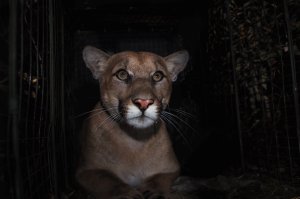A four-year-old mountain lion who successfully traversed the 405 Freeway just last June was struck and killed near the Sepulveda Pass early Saturday, the National Park Service said.

The male cat, known to local wildlife scientists as P-61, was the first GPS-collared mountain lion to cross the 10-lane freeway during the 17 years experts have studied the animals in and around the Santa Monica Mountains.
The California Highway Patrol responded to the Sepulveda Boulevard underpass at around 4 a.m. and moved P-61 out of motorists’ way, according to NPS. Animal control officers subsequently retrieved his body and notified the state Department of Fish and Wildlife and researchers at the Santa Monica Mountains National Recreation Area.
Another mountain lion might have prompted P-61 to cross the 405 again, officials said.
“Based on his GPS points, he had been staying close to the eastern edge of the 405 more recently,” NPS said in an Instagram post. “Over the last few years, we and others have gotten remote camera photos of an uncollared male mountain lion that apparently lives in that area. A negative encounter between the two could have caused P-61 to move back west.”
Male mountain lions are territorial and typically do not share the same habitat.
“Male mountain lions do not play well together, they do not share the same habitat. They need their own space, and so, possibly, they got into a scuffle,” Santa Monica Mountains spokeswoman Ana Beatriz Cholo told KTLA. “If that’s the case, then he was trying to get away from the other mountain lion.”
Officials captured P-61 in October 2017 on the eastern end of the Santa Monica Mountains. He was less than two years old and weighed 97 pounds. He weighed 119 pounds when scientists last made contact with him, NPS said.
At least 19 mountain lions have been struck to death by vehicles in the area monitored by the Park Service since 2002.
A month before P-61 was first captured, biologists found the remains of P-27, an adult male mountain lion who had dominated the eastern region mountains since at least 2013.
Authorities have been planning to build wildlife crossing bridges that would let mountain lions move safely across the 405 and 101, which have forced the big cats to stay in isolated habitats. This has led to low genetic diversity that’s threatening the animals’ long-term survival.
Mountain lions are not a threatened species in California, but environmentalists have argued that a subpopulation of mountain lions in the state could face extinction. A nonprofit group called the Center for Biological Diversity last June submitted a petition to the state Fish and Game Commission seeking protective status for the animals.
“P-61’s tragic death underscores the larger threat facing Southern California mountain lions,” said J.P. Rose, an attorney with the group. “They are hemmed in by freeways which prevent them from maintaining healthy populations and scientists predict they may go extinct in the next few decades unless things change. That’s why we petitioned state officials to protect mountain lions under the California Endangered Species Act, which would result in more wildlife crossings and safer roads.”












